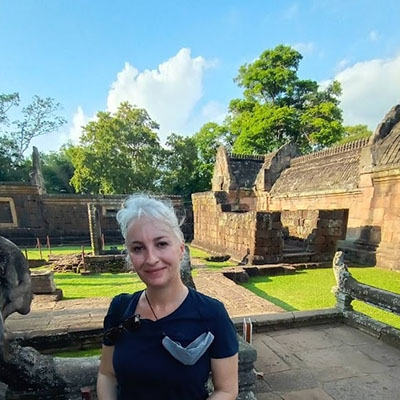If you work in Thailand (ประเทศไทย), you’ll need to pay into the country’s social security system. This provides a series of protections, including compensation for sickness and unemployment. The exact amount you’ll contribute varies depending on your earnings and whether you’re employed or self-employed.
Read on to learn about social security in Thailand, including information on the following:
- An overview of social security in Thailand
- Who is eligible for social security in Thailand?
- Who has to register for social security in Thailand?
- How do you receive social security in Thailand as an expat?
- Social security and unemployment benefits in Thailand
- Social security and sickness benefits in Thailand
- Does Thailand provide disability benefits?
- What are the old-age benefits like in Thailand?
- Social security for death and funeral payments
- Does Thailand provide universal health insurance?
- Social security, maternity, and child benefits in Thailand
- Self-employed workers and freelancers in Thailand
- Part-time workers, low-earners, and students in Thailand
- Useful resources
Allianz Care
Allianz Care is a world leader in providing international health insurance. Their various premiums provide professionally designed solutions for a variety of expat lifestyles. So, wherever your life takes you, make sure you have the right health protection for you and your family with Allianz Care.
An overview of social security in Thailand
Founded in 1990, the Social Security Office (SSO – สำนักงานประกันสังคม) oversees Thailand’s benefits system and falls under the Ministry of Labor (MOL – กระทรวงแรงงาน) contributions from employers, employees, and the government funds the scheme. It is underpinned by the 2015 Social Security Act (พ.ร.บ. ประกันสังคม).

Social security registration is mandatory for anyone working for a Thai employer under the country’s labor law. Expats and Thai citizens are eligible for the same benefits as long as they contribute.
Thailand’s social security system provides the following protections for workers:
- Unemployment benefits (เงินชดเชยการว่างงาน)
- Sickness benefits (ผลประโยชน์การเจ็บป่วย)
- Disability benefits (ผลประโยชน์ด้านความพิการ)
- Old-age benefits (ผลประโยชน์วัยชรา)
- Funeral benefits (ผลประโยชน์งานศพ)
- Maternity and childcare benefits (ผลประโยชน์การคลอดบุตรและการดูแลเด็ก)
The Thai system has faced struggles in recent years. The government cut social security contributions significantly in 2022 to aid the country’s recovery from the COVID-19 pandemic, resulting in a fall of nearly ฿18 billion in revenue.
Of course, unemployment and sickness claims also increased during the pandemic, placing more significant strain on the system.
Who is eligible for social security in Thailand?
In principle, almost anyone living in Thailand who pays into the social security system can access its benefits. The main exception is government officials and civil servants, who have separate employee benefit schemes.
The first thing to understand about social security in Thailand is that there are three classifications:
- Section 33 (มาตรา 33)
- Section 39 (มาตรา 39)
- Section 40 (มาตรา 40)
Section 33
If you work for a Thai employer, it will register you for contributions under Section 33.
Section 33 offers the most comprehensive level of coverage, including all of the protections listed above.

The employer and employee split Section 33 contributions equally. As such, you’ll contribute 5% of your wages, which means a minimum payment of ฿83 (if you earn ฿1,650) up to ฿750 (based on a monthly salary of ฿15,000). The government makes an additional, smaller contribution.
Section 39
If you stop working for a company in Thailand, your coverage under Section 33 will expire.
At this point, you can elect to make voluntary social security contributions under Section 39. To qualify, you must have left your job within the last six months and have previously made Section 33 contributions for at least a year.
Section 39 contributions are payable at a flat rate of ฿432 per month (9% of an example monthly wage of ฿4,800). All protections available under Section 33, except unemployment insurance, are also granted under Section 39. If you subsequently work again for a Thai employer, you’ll be transferred back to Section 33.
Section 40
If you don’t qualify for Sections 33 or 39 – for example, if you’re self-employed – you can obtain social security cover under Section 40.
Unlike the other two categories, contributions and benefits are based on a tiered system.
The three contribution levels are:
- Plan 1: ฿70 per month
- Plan 2: ฿100 per month
- Plan 3: ฿300 per month
People who make Plan 3 contributions are eligible for higher levels of coverage. See the section below on social security for self-employed workers for more information.
Who has to register for social security in Thailand?
Section 33
When you start working for a Thai employer, it will be responsible for registering you for social security contributions within 30 days of your start date. Employers must file your registration at their local SSO using form SSO 1-03. You’ll need to provide evidence of your right to live in Thailand (e.g., your visa).

Once registered, you’ll receive a social security number, and the contributions are deducted automatically from your monthly pay.
You may be asked to specify a local hospital as your preferred location for medical care.
Section 39
You can register for voluntary social security contributions under Section 39 at your local SSO. You’ll need to fill out the ‘Voluntary Insured Person Registration as per Section 39’ form (SSO 1-20) and provide identification.
You can contribute via bank transfers or at a physical bank, post office, 7-Eleven, or SSO branch. Your coverage will cease if you fail to make payments for three consecutive months.
Section 40
If you are between 15 and 60 – and do not qualify for Sections 33 or 39 – you can register for Section 40 online or at your local SSO. You will be required to provide identification.
How do you receive social security in Thailand as an expat?
Expats working in Thailand are eligible for the same welfare coverage as Thai nationals. Your employer is responsible for registering you on the system, and if you change jobs, the company will transfer your coverage on your behalf.

Local expert
Jane Evans
Insider tip
Even though there are no reciprocal agreements with other countries, it is possible to receive your Thai social security payments while traveling abroad, as long as you continue making the contributions.
Social security and unemployment benefits in Thailand
Who can get unemployment benefits?
Unemployment (การว่างงาน) benefits are only available to people with Section 33 coverage. The exact benefits depend on why you’ve stopped working. The standard payments are as follows:
| Reason | Benefit |
| Loss of employment due to termination | A payment of 50% of your previous wage for up to 180 days |
| End of contract or resignation | A payment of 30% of your previous wage for up to 90 days |
| Natural causes (e.g. fires, earthquakes, storms) | A payment of 50% of your previous wage for up to 180 days |
How do you claim unemployment benefits?
To qualify for unemployment benefits, you must have made social security contributions for at least six months in the 15 months before you stopped working.
You must register as unemployed and file a report online within 30 days to submit a claim. You can then submit a request for payment at your local SSO, which can be done via money orders or direct bank transfers.
Social security and sickness benefits in Thailand
Who can get sickness benefits?
Sickness benefits (ผลประโยชน์การเจ็บป่วย) are available to people covered under Sections 33 and 39. The amount payable varies depending on the reason for your ill health. The main rules are as follows:
| Reason | Benefit |
| Sickness | Full coverage for medical treatment at a specified SSO hospital If you’re not entitled to pay from your employer while sick, you’ll receive 50% of your wages for up to 90 days (180 days/year) This rises to 365 days for ‘chronic’ diseases |
| Injuries and emergencies | As an outpatient at an SSO hospital, the actual costs will be reimbursed As an inpatient, you can claim up to ฿700 for room and meal costs and medical expenses incurred during the first 72 hours |
| Treatment at private hospitals | For injuries and emergencies, outpatient fees are reimbursable up to ฿1,000 Caps on inpatient reimbursements depending on the treatment required |
| Dental treatment | Reimbursement of up to ฿900/year is available for routine dental treatment Higher limits are in place for dentures |
How do you claim sickness benefits?
To qualify for sickness benefits, you need to have made social security contributions for at least three months in the fifteen months before you first received medical care. You’ll need to claim via your local SSO if you require reimbursement for hospital fees.
Does Thailand provide disability benefits?
Who can get disability benefits?
Disability (ความพิการ) compensation in Thailand is split into two categories: ‘minor’ and ‘severe.’ Even though the government does not list specific disabilities, they do class these as follows:
- Minor: 34–49% loss of capacity
- Severe: 50% plus loss of capacity
| Category | Benefits |
| Minor disabilities | If you cannot work, you’ll get 30% of your income for up to 180 months (maximum is ฿3,000/month) |
| Severe disabilities | You will receive 50% of your wage for the rest of your life |
How do you claim disability benefits?
To qualify, you must have made contributions for at least three months before becoming disabled. You must submit a medical certificate from a Thai hospital to your local SSO to make a claim.
What are the old-age benefits like in Thailand?
Who can get old-age benefits?
If you make social security contributions under Sections 33 or 39 for at least 15 years, you’ll qualify for an old-age (วัยชรา) pension (SSO pension) when you retire (as young as 55).
The sum payable for 15 years of contributions is 20% of your average wage earned during the 60 months before you retire. However, if you paid into the social security system for more than 15 years, you’ll receive a further 1.5% for each additional qualifying year (e.g., 1.5% for 16 years, 23% for 17 years, and so on).
Partial payments are available if you’ve made less than 15 years of contributions, as follows:
| Period of contributions | Payout |
| Less than 12 months | Upon retirement, receive a lump sum (i.e., ‘old-age gratuity’) – equal to the contributions you made |
| More than 12 months, less than 15 years | Receive an ‘old-age gratuity’ equal to your contributions, your employer’s contributions, and any other benefits stipulated by the SSO |
If a worker qualifies for an SSO pension but dies within five years, their next of kin receives a one-off payment equal to 10 times the monthly pension payment the deceased was entitled to.
How do you claim old-age benefits?
The standard retirement age in Thailand is 60. However, workers covered by the social security system are entitled to old-age benefits from age 55.
Social security for death and funeral payments
Who can get death and funeral payments?
The next of kin of an insured person is eligible for a funeral grant (ทุนช่วยเหลืองานศพ) of ฿40,000 and a wage-based compensation payment on their death (การตาย).

If the deceased made social security contributions for 10 years or more, compensation is 50% of their average yearly wage. If they had made between three and 10 years of payments, the benefit is 50% of their average wage for four months.
How do you claim funeral and death payments?
To qualify for death benefits, the deceased must have made social security contributions for at least one month in the six months before their death.
Does Thailand provide universal health insurance?
There are three main avenues to receiving public healthcare (การดูแลสุขภาพ) in Thailand, namely:
- Social security system (ระบบประกันสังคม)
- Universal Coverage Scheme (UCS – โครงการความคุ้มครองสากล)
- Civil Servant Medical Benefit Scheme (CSMBS – โครงการสวัสดิการรักษาพยาบาลข้าราชการ)
If you work for a Thai employer, you’ll be automatically enrolled in the social security system, giving you access to public healthcare at state hospitals.
Public sector workers are granted coverage under the Universal Coverage Scheme (UCS), funded by taxes rather than individual contributions.
You’ll be covered under the Civil Servant Medical Benefit Scheme (CSMBS) if you’re a civil servant or government employee.
These schemes don’t cover expats who are self-employed, unemployed, or moving to Thailand to retire. Instead, they will need to take out a separate private health insurance plan. Reputable insurance providers in Thailand include:
Many expats choose to take out private coverage despite having access to public healthcare, as they may benefit from shorter waiting times, a more comprehensive network of specialists, and complete medical coverage.
Social security, maternity, and child benefits in Thailand
Two primary forms of child benefit are payable to new parents in Thailand: childbirth and child allowance.
Childbirth benefit
There are three categories of childbirth benefits:
- Pregnancy care expenses: Covers five prenatal visits up to a maximum cost of ฿1,500
- Childbirth allowance: A lump sum of ฿15,000 payable when the child is born, even if only the father – and not the mother – is covered by the social security scheme
- Maternity leave: Payable at 50% of the mother’s annual earnings for 90 days. To qualify, she needs to have made at least five months of contributions in the 15 months before having the baby.

Child allowance
Parents with social security coverage receive a monthly lump sum of ฿600 per child up to the age of six (capped at three children), which can help with expenses like childcare. This allowance is only granted to people who’ve made at least one year of social security contributions in three years before making a claim.
Self-employed workers and freelancers in Thailand
Self-employed workers in Thailand can obtain social security coverage by making voluntary contributions under Section 40.
The three contribution levels are available as stipulated below.
Accident and sickness compensation
To qualify, you should’ve made contributions in three of the four months immediately before the accident or sickness occurred.
| Condition | Plan 1 (฿70/ month) | Plan 2 (฿100/ month) | Plan 3 (฿300/ month) |
| Being hospitalized for at least one day | ฿300 per day | ฿300 per day | ฿300 per day |
| Being ordered to rest for at least three days (not hospitalized) | ฿200 per day | ฿200 per day | ฿200 per day |
| Undergoing outpatient treatment | ฿50 per instance | ฿50 per instance | Not covered |
People paying into Plan 3 (฿300 per month) are entitled to 90 days of coverage each year, while those paying into Plans 1 and 2 are entitled to 30 days of coverage per year.
Disability compensation
There are four levels of disability compensation, which vary depending on how long you’ve been making contributions.
| Months of contributions before disability | Monthly payouts |
| 6 of the 10 months | ฿500 |
| 12 of the 20 months | ฿650 |
| 24 of the 40 months | ฿800 |
| 36 of the 60 months | ฿1,000 |
If you pay into Plan 3, compensation lasts for your whole life. However, Plans 1 and 2 will only cover you for 15 years. Additionally, people paying into Plan 3 are entitled to a ฿50,000 funeral subsidy, compared to ฿25,000 for those on Plans 1 and 2.
Death benefits
To qualify for death benefits, the deceased must have made contributions for at least six of the 12 months before death.
The standard funeral subsidy is ฿25,000 (Plans 1 and 2), rising to ฿50,000 if the deceased made Plan 3 contributions.
An additional payment of ฿8,000 is available for people who made Plan 1 or Plan 2 contributions if they did so for at least five years.
Old-age benefits
Old-age benefits are available from age 60 once your insured status under Section 40 ceases. The government will top up your contributions with the following amounts:
| Plan | Your contribution/month | Government contribution/month |
| 1 | ฿70 | None |
| 2 | ฿100 | ฿50 |
| 3 | ฿300 | ฿150 |
Indeed, you can make additional installments of up to ฿1,000 per month, but the government’s contribution is capped at ฿150.
On retirement, you’ll be entitled to a lump sum based on the contributions you and the government have made. Notably, if you pay into Plan 3 for at least 15 years, you’ll qualify for an additional grant of ฿10,000.
Child allowance
People who make Plan 3 contributions are eligible for a monthly payment of ฿200 per person. However, they must have made contributions in 24 of the last 36 months to qualify.
Part-time workers, low-earners, and students in Thailand
As social security contributions begin at a low level in Thailand, part-time workers and low earners should still be able to access coverage. However, students and undergraduates working for educational establishments do not qualify for the social security system.
Useful resources
- Social Security Office (SSO) – government body overseeing the social security system in Thailand
- SSO guide – a handy PDF summary visually explaining the social security system
- Ministry of Labor (MOL) – the official government website





